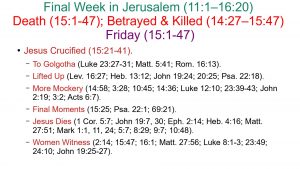Jesus’ Final Week in Jerusalem
Mark 11:1–16:20
Teaching (11:1–13:37)
King (11:1-11)
Sunday: Triumphal Entry (11:1-11).
Lawgiver (11:12–12:44)
Monday (11:12-19).
Tuesday (11:20–14:2).
Prophet (13:1-37)
Trial (14:1-72)
Sacrifice (14:1-26)
Wednesday (14:3-11).
Thursday (14:12-72)
Betrayed and Killed (14:27–15:47)
Death (15:1-47)
Friday (15:1-47).
Before Pilate (15:1-15).
Jesus Mocked (15:16-20).
Jesus Crucified (15:21-41).
To Golgotha (15:21).
Lifted Up (15:22-28).
More Mockery (15:29-32).
Jesus then suffered even more indignity as He was hanging on that cross.
Of course, that was the point of crucifixion, to suffer the humiliation of a very slow and very public death.
They “blasphemed” Him, which is to say they spoke evil against Him.
They wagged, or shook, their heads while speaking such evil things.
They must have heard the false accusations that were made against Jesus in His trial before the Sanhedrin (14:58), or perhaps they remembered when He said this all the way back in John 2:19.
I’m so glad that Jesus said they could be forgiven for blaspheming against the Son, as I’m sure 3000 of them were glad in Acts 2 when they heard the gospel from the mouths of Peter and the other Apostles (Mark 3:28; Luke 12:10).
They were trying to goad Him into coming down off the cross Himself.
Could He? Why, of course He could. But He wasn’t going to.
Why? Because He had a job to do.
This was the reason for His coming (10:45) and He prayed for His Father’s will to be accomplished, not His own (14:36).
I mean, He could walk on water! Surely coming down off the cross would’ve been no big deal.
But what would be the greater miracle? To come down off the cross or to be raised from the dead three days after such a horrific death?
 [Distance of Via Dolorosa is anywhere between 1/7 of a mile—2.5 football fields—to nearly half a mile—8 football fields—as the crow flies. The traditional path is a little less than 2/5 of a mile—about 6 2/3 football fields—as the crow flies, it is about ¼ of a mile—4 football fields.]
[Distance of Via Dolorosa is anywhere between 1/7 of a mile—2.5 football fields—to nearly half a mile—8 football fields—as the crow flies. The traditional path is a little less than 2/5 of a mile—about 6 2/3 football fields—as the crow flies, it is about ¼ of a mile—4 football fields.]Not only did the passersby mock Him, but so did the chief priests and the scribes saying among themselves that He could save others but not Himself.
But of course, His goal wasn’t to save Himself was it? His goal was to save others.
 They claimed they would believe in Jesus as the Christ, as the King of Israel, if He would come down off the cross.
They claimed they would believe in Jesus as the Christ, as the King of Israel, if He would come down off the cross.But their claims were no doubt dishonest as they had sign after sign after sign to prove His identity—Nicodemus, a Pharisee, acknowledged that himself (John 3:2).
To their credit, however, many priests did become “obedient to the faith” after Jesus rose from the dead (Acts 6:7).
It got so bad that even the two criminals on either side were saying bad things about Him.
It doesn’t say what they said here, but Luke records that at least one of them said, “If You are the Christ, save Yourself and us” (Luke 23:39).
It would seem they had their own self-interest at heart.
Yet it did become clear to one of them later on that this Jesus was someone special, as we see Luke continue to discuss the “thief on the cross” (Luke 23:40-43).
The sixth hour had come—noon.
By that time, He had been on the cross for three hours (15:25), and darkness finally falls when the sun is the highest in the sky.
This darkness lasts for three hours until the ninth hour—3 PM.
This translates to His being on the cross for six, long, agonizing, grueling hours before He finally breathes His last.
Some try to explain this darkness as a natural phenomenon, like a solar eclipse, but there are two big problems with this notion.
The longest a solar eclipse can last is only about 7 minutes—hardly the three hours that the Bible records.
The second problem is, this is during the Passover week when the moon is full. That means it is on the opposite side of the earth from the sun, making a solar eclipse utterly impossible.
No, this is not a natural event at all, but entirely supernatural.
This reflects the immense sadness that God the Father felt at the death of His Son, and even the covering of His shame and humiliation.
At this ninth hour, 3 PM, He cries out with a loud voice a quotation from Psalm 22:1 first in Hebrew or Aramaic, then Mark translates it into Greek (we have it in English).
What did Jesus mean here by quoting this passage? There are a couple different ideas for that.
The first and one of the most common is that the Father really had forsaken the Son, that God somehow separated from God and that it brought much pain to the Father and the Son, far more than the physical pain He was experiencing at this time.
The second—this I was taught in school, and one I think is more likely—is that Jesus is quoting from Psalm 22 as we might quote the first line of a song to let others know what we mean. It’s like saying simple, “Amazing grace, how sweet the sound,” and we know exactly how that song ends.
In Psalm 22, it starts off talking as if God had abandoned the Sufferer, even talking of His side being pierced, His garments being gambled over, and His bones not being broken—but it ends with His justification.
This is a Messianic Psalm, prophesying this exact moment, and He is calling it to mind, letting people know, “Remember this psalm? Yeah, it’s happening now!” How many are listening?
Well, we see in the next couple of verses that they are not really listening.
The writer first records this quotation in either Hebrew or Aramaic because it explains how the onlookers could mistake what Jesus was crying out with a call for Elijah. “Eloi” sounds an awful lot like “Eliyah.”
This further mocks the Lord by saying that He needs Elijah to come help Him.
In vs. 36, it is hard to tell whether or not this individual was being supportive or continuing the mockery, but the latter would fit the theme of the events thus far.
The sour wine that is mentioned here was a very common drink and a refreshing beverage that quenched thirst more efficiently than water.
On the other hand, Psa. 69:21, using the same word in the LXX, suggests that it was an insulting gesture to offer it when thirsty.
If he were being supportive, then what he says could be taken as hopeful, however the Greek suggests this statement was conditional, expressing a doubtful expectation.
So it would appear that the mockery continued and the sour wine was adding to the agony and humiliation.


